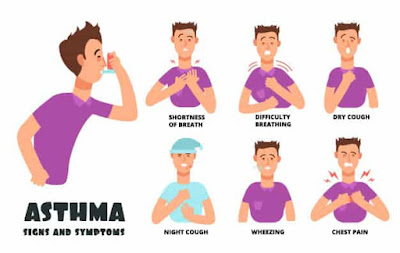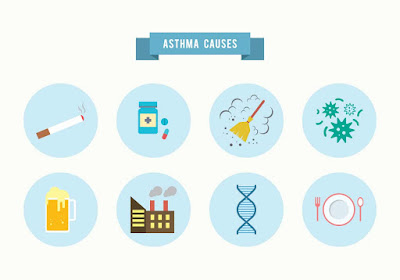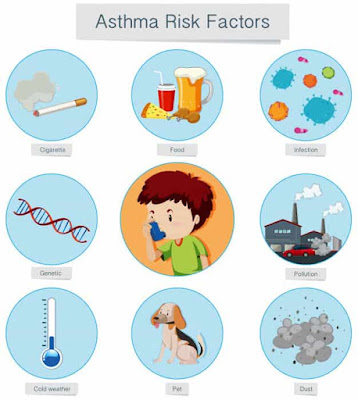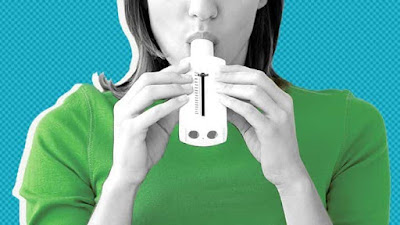WHAT IS THE MEANING OF ASTHMA?
WHAT IS ASTHMA?
airways swell and become narrow. Further, it makes it difficult for you to
breathe and can make some daily activities challenging or even
impossible.
Many people find asthma to be a minor nuisance. Chronic conditions
of asthma may often lead to a life-threatening asthma attack.
Let’s understand Asthma in detail.
What are the symptoms of Asthma?
Symptoms of asthma differ from one person to another. Here we list
the symptoms of asthma:
 |
| Asthma symptoms |
- Shortness
of breath - Chest
tightness - Wheezing
(causes a whistling sound when you exhale) - Sleeping
Troubles (caused by shortness of breath, coughing, or wheezing) - Coughing attacks
that worsen during cough or flu.
What are the signs that predict your asthma is worsening?
Signs that predict your asthma is probably worsening are:
- Experiencing
more frequent signs and symptoms of asthma - Increased
difficulty in breathing - Using
quick-relief inhaler for more often times
What are the Causes of Asthma?
The exact cause of asthma is unknown. But some of the causes that
are Asthma triggers are as follows:
- Respiratory
infections (Common cold) - Physical
activity - Airborne
allergens (such as pollen, dust mites, mold spores) - Cold
air - Air
pollutants - Certain
medications (Aspirin, Advil, Motrin IB, etc.) - Stress
- Gastroesophageal
reflux disease (GERD).
What are the risk factors and complications?
Risk factors:
There are several factors that increase your chances of developing
asthma. They are:
- Genes
(having a blood relative with asthma) - Allergic
conditions (atopic dermatitis, itchy skin) - Overweight
- Smoking
- Exposure
to pollution - Exposure
to chemicals used in farming.
What are the types of Asthma?
Types of Asthma include:
Childhood Asthma: Asthma is very common in children.
According to research associations common triggers of asthma in
children include:
- Allergens
- Respiratory
infections - Cigarette
smoke - Sudden
changes in temperature - Stress
- Exercise
- Exposure
to cold air
It is very essential to seek medications if you find these
symptoms in children.
Adult Asthma: Asthma can develop at any age even
if you are an adult or a child. Major risk factors triggering asthma are:
- Obesity
- Genes
- Respiratory
illness - Exposure
to allergens - Smoking
- Stress
Occupational Asthma: It is
very evident from the name that this type is based on occupation. Allergens
found in the workplace such as in bakeries, flour mills, pet shops, laboratories
where animals are present, kitchens, etc. may cause asthma.
Also, people who smoke are at a high risk of developing
asthma.
Complications
Complications of Asthma include:
- Sick
days from work during an asthma - Symptoms
interfering with sleep - Permanent
narrowing of bronchial tubes ( they carry air to or from your lungs) - Severe
asthma attacks - Side
effects from long-term use of some medications
What is its Diagnosis?
An asthma diagnosis is based on your medical history, a physical
exam, and results from diagnostic tests.
Diagnostic tests include:
- Pulmonary
function tests - Bronchoprovocation
tests - Spirometry
with bronchodilator tests - Peak
expiratory flow (PEF) tests - Blood
tests - Fractional
exhaled nitric oxide (FeNO) tests.
What is the Prevention of Asthma?
Asthma attacks can be prevented by taking care of few points:
- You
should follow your asthma action plan. Plan yourself for taking medications properly in time. Start monitoring the on-going conditions of asthma.
- Get
vaccinated for influenza and pneumonia.
- Vaccinating yourself can prevent flu and pneumonia from triggering asthma flare-ups.
- You
should learn to monitor your breathing by recognizing symptoms of cough,
wheezing, or shortness of breath. You can measure your breathing rate by a
device called a peak flow meter.
- Avoid
asthma triggers by finding out the cause that worsens your asthma.
- Don’t
wait for your condition to be worsened. If you identify the symptoms as early as possible then you might likely have severe attacks.
- Take
your medicines on time without skipping them. Do not change your medications if you see improvements in yourself. Consult your doctor so that he can make sure you’re using your medications correctly and taking the right dose.
- Consult
doctors if you are using inhalers many times.
When to consult a doctor?
- Immediately
rush to your doctor if you find signs such as:
- Instant
worsening of shortness of breath - No
relief even while using inhalers.
- If
you find coughing or wheezing for many days, see your doctor. If you treat
your asthma as early as possible you will be able to prevent your lungs from
long-term damage. - Have
a regular routine check-up by consulting your doctor. Monitoring and taking good care of yourself can prevent severe asthma attacks. - When
you find that your asthma symptoms are worsening rush to your doctor.
Don’t take more medication than prescribed without consulting your doctor first. By doing so you may find side effects and further may experience worsened conditions of asthma.
Thus, Asthma is a condition in which your airways narrow and
swell, further causing difficulty to breathe and shortness of breath.
Opting for effective medications and treatment can make you lead a
healthy life even with asthma.
Frequently Asked Questions
1.How to treat Asthma effectively?
The best treatment starts with, looking for the best physician who
cares for the patient, at least, as much as he cares for the disease.
The use of steroids should be strictly restricted.
2.If you have asthma symptoms from
reflux, will inhalers help?
Although asthma can be triggered by food protein allergens coming
from gastric reflux, it would be better to find a doctor first to have yourself
treated with gastric reflux. You must treat or avoid the cause first so that it
would not frequently reoccur. In other words, treating asthma without treating
the cause would keep asthma from coming back.
Inhaler therapy or controllers are usually given along with
bronchodilator therapy. So, better go back to your doctor and have yourself
checked.
3.How do you stop an asthma attack
without an inhaler?
The cure for asthma is mainly done through medicines but some of
the natural methods which can relieve you from asthma without an inhaler are:
- Eucalyptus
oil: It opens up nasal blockage for easy breathing. - Mustard
Oil: Mustard oil combined with camphor is the best combination for
providing quiet relief. - Ginger:
Ginger is beneficial for your body and health. It is considered to be a
superfood and is good for asthma. - Figs:
Figs are the best home remedy for asthma. - Omega-3
fatty acids: They are very useful in managing inflammatory conditions. It treats almost all the conditions including depression, seasonal affective disorder, depression, heart disease along with asthma.








Leave a Reply